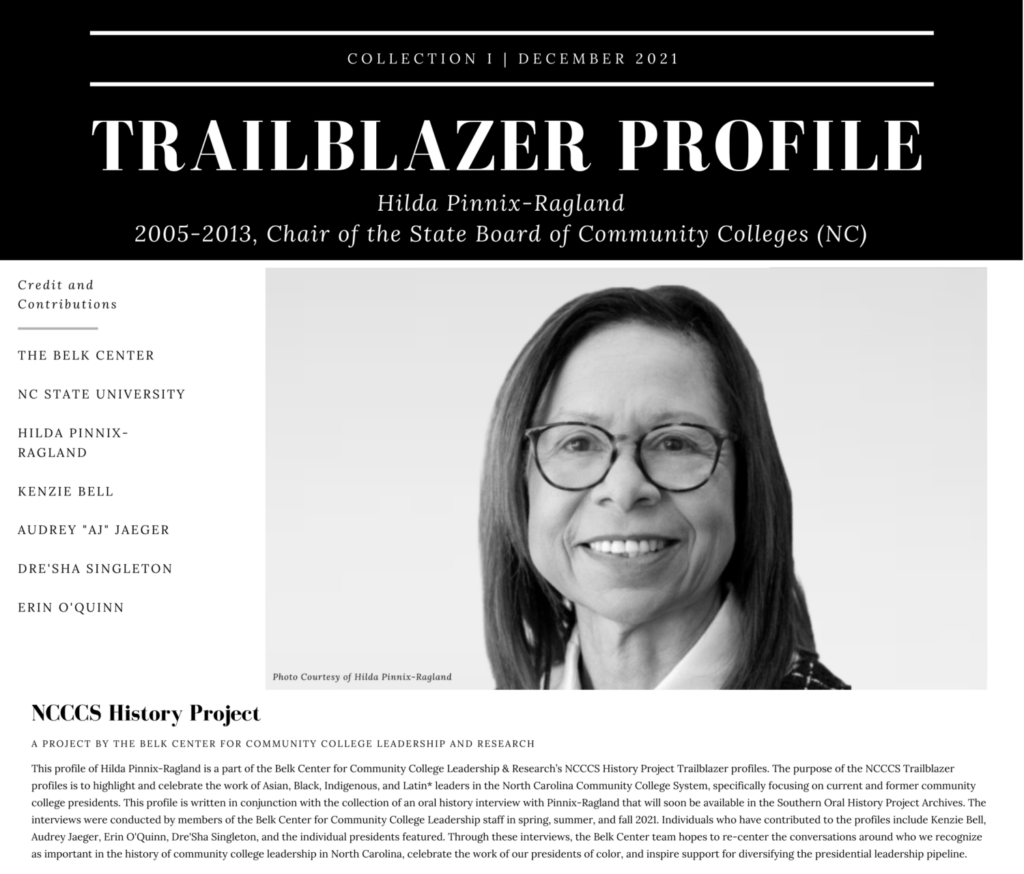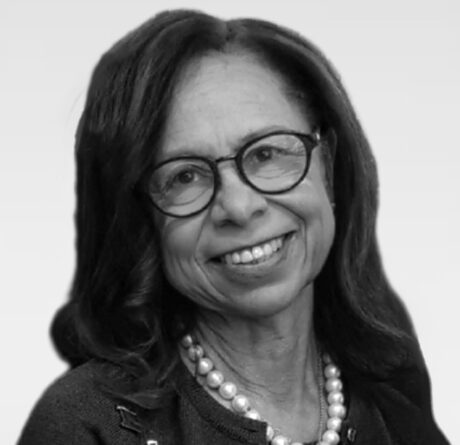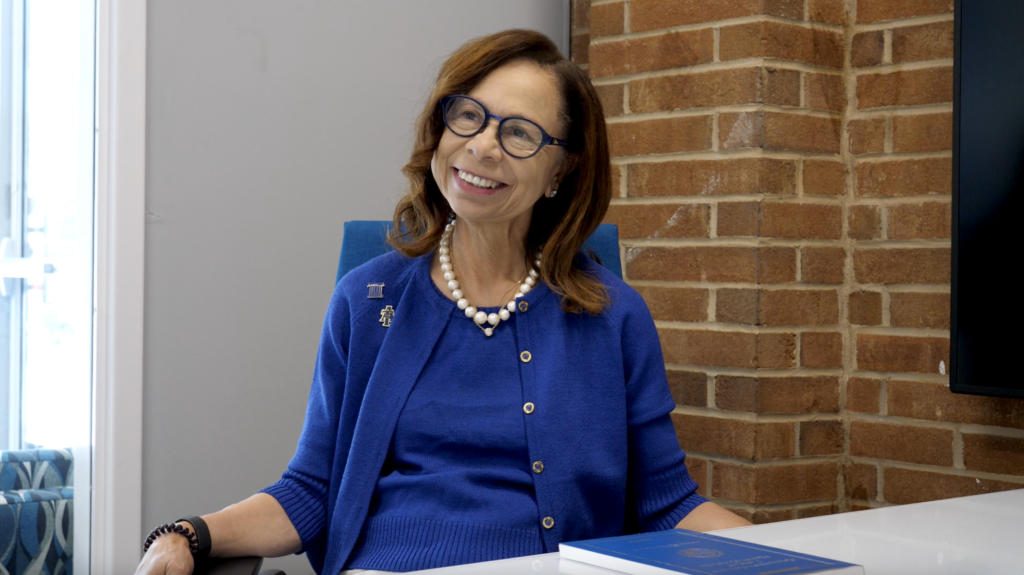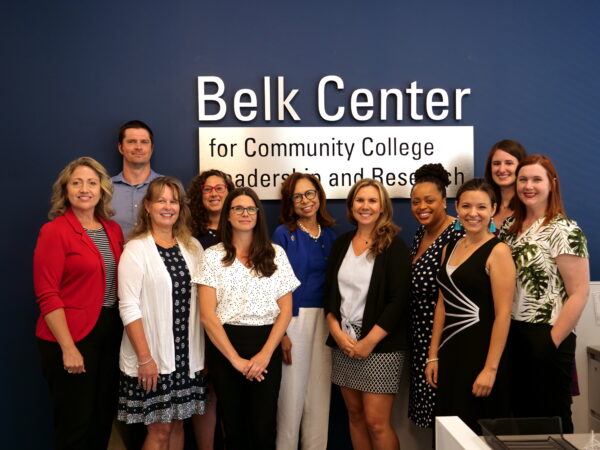Trailblazer Profile: Hilda Pinnix Ragland

Hhilda Pinnix-Ragland
Hilda Pinnix-Ragland has broken race and gender barriers her entire life. In 1965, she was escorted to school by U.S. Marshals while integrating Aycock Elementary Schools in Orange County. In 1978, she became one of the first women senior auditors at Arthur Andersen in New York. In 1995, she became the first woman and woman of color to be promoted to District Manager of Distribution Operations at Carolina Power & Light Co. She continued to progress with the energy company – which was renamed Progress Energy in 2000 and bought by Duke Energy in 2011 – as its first African American Vice President. She ultimately would serve as an executive officer at Duke Energy for almost 20 years before retirement.
Pinnix-Ragland even continued to break the race barrier outside her professional accomplishments. In 2013, she and her husband, Alvin, became the first African-American members in the Carolina Country Club’s 103-year history. To put it simply, Pinnix-Ragland has been a Trailblazer wherever she’s gone.

Another of her trailblazing accomplishments? Becoming the first woman and the first person of color to chair the board of the North Carolina Community College System – a position pitched to her on a bus in Buenos Aires by then-governor James “Jim” Hunt. “When Governor Hunt wanted you to do something, he would say, ‘Come sit next to me.’ I did not know it at the time, but I was being set up to take the actual board seat for a deceased member,” says Pinnix-Ragland. “Governor Hunt asked me if I would accept the community college role and fulfill an unexpired term.” And, jokes Pinnix-Ragland, you don’t say no to Governor Hunt!
Soon after her appointment to the board of community colleges in 1999, it came time to elect a new board chair – a position which Pinnix-Ragland did not expect to be considered. Says Pinnix-Ragland, “I really didn’t know whether I was going to get elected. Here I was, the youngest person on the board, a woman and an African American.” Someone else, however, was very confident about how the election would turn out.
“The night before the vote, the guy who thought he was going to be chair went ahead and said, ‘I’m moving into my office’.” The move was premature. Pinnix-Ragland won in a landslide and the man who tried to take over the chair’s office before the election received only two votes – one of which was his own.
Pinnix-Ragland was the first woman and the first African American to hold the role, and would end up being reelected for four consecutive terms before stepping down in 2013, after 15 years of service to the state’s community college system.


Early on in her tenure, Pinnix-Ragland fell in love with the community college system. “I love the fact that there were 58 community colleges throughout 100 of our counties. I was on a mission to go to every community college and to visit every county. If one county did not have access, then under my reign, I would try to change that.” She achieved the goal of visiting each college several times over. Says Pinnix-Ragland, “I spoke at every graduation several times. I always selected the rural counties first. Once, I actually accepted three graduations on the same day. I didn’t know how at the time I would move from county to county, but I did.”
One of the most memorable parts of Pinnix-Ragland’s tenure as board chair came in 2009, when the board was deciding whether or not to allow undocumented immigrants to attend community colleges in North Carolina. The debate was so heated that Pinnix-Ragland and system president Dr. Scott Ralls received threats on their lives and had city police officers assigned to their security detail. Pinnix-Ragland says that she received calls from U.S. senators and members of the House of Representatives from Washington D.C., as the vote received national attention.
“Often people will ask me, ‘Hilda, were you scared?’ I wasn’t scared,” says Pinnix-Ragland. “I was the first African American to run the construction, maintenance and restoration of the power system. I was a woman and a hardhead. I wasn’t scared when it came to community colleges. I just knew that I wasn’t walking alone and I felt good. I felt good about the cause, the mission and education. Our family was one of the first to integrate schools. I was escorted to school by the U.S. Marshals in Orange County. So maybe I just have tough skin. Maybe I’m just kind of crazy. But I wasn’t scared.”
On the day of the vote, Pinnix-Ragland and Dr. Ralls came in the back door with a police escort. She remembers, “The room was packed. But then I saw a familiar face sitting on the front row, around this board table, and it was none other than [former] Governor Hunt. Governor Hunt was there and he had filled the room with undocumented students. Whoever comes first, would be the ones that would be there. No one could come in to oppose. It was a beautiful day.” In the end, the North Carolina Community College System became one of the first in the nation to accept undocumented students, a feat Pinnix-Ragland is proud to have as a part of her lasting legacy.
While Pinnix-Ragland had not sought out work with the community college system, she already had personal connections. Pinnix-Ragland’s father was one of the first African Americans to get a degree from the North Carolina Community College System. On her father’s connection to the community college system, Pinnix-Ragland says, “He was so instrumental in trying to raise funds for the community college system. He wanted students to go to school. He wanted all students, and he would just pay for students to go to school. It’s deep in my DNA.”
Pinnix-Ragland herself attended North Carolina A&T State University, where she received a bachelor’s degree in accounting. She also holds a Master of Business Administration from Duke University Fuqua School of Business and completed graduate studies in taxation from St. John’s University and the Executive Program from Harvard University’s Kennedy School of Government. Just like her father, Pinnix-Ragland believes in supporting educational opportunities for all students. In 2012, she created the Hilda Pinnix-Ragland Freshman Endowed Scholarship, which provides scholarships for students accepted to attend NC A&T State University to pursue a degree in accounting. She also currently serves as chair on the school’s board of trustees.
Beyond her work with the community college system and NC A&T, Pinnix-Ragland has shown her commitment to quality education opportunities for all students through the creation of the Hilda Pinnix-Ragland Girls Summer STEM Academy. The STEM Academy operates in partnership with Wake County Schools, community centers and faith-based entities to provide underexposed rising 5th grade girls with unique opportunities to participate in a free week of summer academy learning. “Education is deep rooted in my family’s history and in my heart,” says Pinnix-Ragland. “And so, until the day I die, I’ll continue to promote excellent education for all students.”

While Pinnix-Ragland no longer serves on the board, she still has a deep love of the North Carolina Community College System. “Once you’re connected with community colleges, you will always be connected to them,” she says. Yet she also knows that there is work that needs to be done. Pinnix-Ragland believes that it is vital for the North Carolina Community College System to increase the diversity of its presidents. “One of the things that I think there’s still a lot of work to be done with, other than pay equity for women and people of color, is getting more women to be presidents of the community college system. To me, it’s a shame. Wake Tech had the first woman, but we need more women in leadership,” says Pinnix-Ragland. “It’s amazing that we have mostly women professors, but, in general, we don’t have them as presidents, and that’s where the money is.”
Pinnix-Ragland knows that trailblazing is hard work, but she believes it is vital in order to make space for others to follow. She has three endowed scholarships and one endowed professorship in business economics. “If you blaze a trail for yourself alone, you’ve done nothing. If you blaze a trail and widen it for others to walk through, around, under, and you walk beside, then you’ve made progress,” says Pinnix-Ragland. “But it’s up to each one of us to bring others along, and to ask them to do the same. And then to be bold, have courage, and get into some good trouble.”
Collection 1 | December 2021